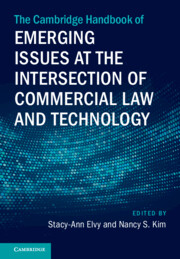Book contents
- The Cambridge Handbook of Emerging Issues at the Intersection of Commercial Law and Technology
- The Cambridge Handbook of Emerging Issues at the Intersection of Commercial Law and Technology
- Copyright page
- Epigraph
- Contents
- Figures
- Tables
- Contributors
- Preface
- Acknowledgments
- Part I Contemporary Technological Developments
- Part II The Implications of Emerging Product Design and Business Models
- Part III Contracting and Dispute Resolution
- 14 Contract and Commercial Law Challenges with AI Products and Services
- 15 How Smart Are Smart Readers? LLMs and the Future of the No-Reading Problem
- 16 Deconstructing Smart Contracts
- 17 Artificial Intelligence and Contract Formation
- 18 Consumer Contracting in the Smartphone Era
- 19 Evolution and Emerging Issues in Consumer Online Dispute Resolution (ODR)
- Index
16 - Deconstructing Smart Contracts
from Part III - Contracting and Dispute Resolution
Published online by Cambridge University Press: 08 February 2025
- The Cambridge Handbook of Emerging Issues at the Intersection of Commercial Law and Technology
- The Cambridge Handbook of Emerging Issues at the Intersection of Commercial Law and Technology
- Copyright page
- Epigraph
- Contents
- Figures
- Tables
- Contributors
- Preface
- Acknowledgments
- Part I Contemporary Technological Developments
- Part II The Implications of Emerging Product Design and Business Models
- Part III Contracting and Dispute Resolution
- 14 Contract and Commercial Law Challenges with AI Products and Services
- 15 How Smart Are Smart Readers? LLMs and the Future of the No-Reading Problem
- 16 Deconstructing Smart Contracts
- 17 Artificial Intelligence and Contract Formation
- 18 Consumer Contracting in the Smartphone Era
- 19 Evolution and Emerging Issues in Consumer Online Dispute Resolution (ODR)
- Index
Summary
From a distance, smart contracts seem exciting: Unlike humans, who might opportunistically decide to deviate from the agreed terms, their code will execute “no-matter-what,” ensuring the terms are adhered to and the contract is performed. Smart contracts would thus seem like a valuable addition to conventional contracts. A perfect transaction technology, indeed! A closer analysis of the smart contract narrative and the relevant technical scholarship reveals a peculiar dissonance between how smart contracts are described and what smart contracts really are. Taking the unfortunate terminology at face value and analyzing smart contracts as if they were contracts in the legal sense might constitute a waste of academic time. Even if they constituted an improvement over existing transacting practices, would – or could – smart contracts still be contracts? Would they even belong to the same category of legal phenomena? Maybe the fundamental question is: what are smart contracts? To many, these questions may seem like unnecessary hairsplitting, typical of haughty academics. In practice, however, how something is defined and categorized has immediate practical implications. Sidestepping the overly optimistic narrative of “unstoppable legal innovation,” this chapter deconstructs the concept of smart contracts and aims to provide a more commonsensical and factual grounding for future legal analyses of this phenomenon.
- Type
- Chapter
- Information
- The Cambridge Handbook of Emerging Issues at the Intersection of Commercial Law and Technology , pp. 375 - 396Publisher: Cambridge University PressPrint publication year: 2025

